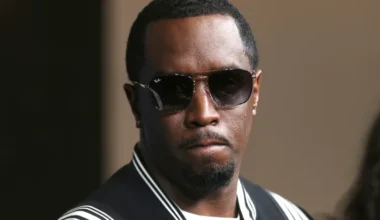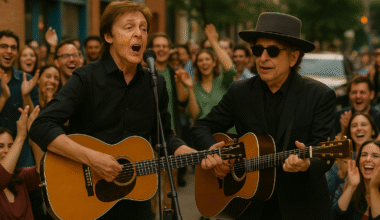Queen’s electrifying Live Aid performance at Wembley Stadium in 1985 is remembered as one of the greatest concerts in rock history. The band’s legendary frontman, Freddie Mercury, was at the peak of his power, commanding the stage with unparalleled energy and showmanship. But one of the most iconic moments of that performance—the now-famous “Ayo” chant—was completely improvised, as Queen guitarist Brian May recently revealed.
The magic of Live Aid was largely attributed to the dynamic connection Freddie Mercury shared with the audience. Despite a star-studded lineup featuring Elton John, U2, David Bowie, and others, it was Queen’s performance that stole the show. The energy was palpable, and Freddie’s larger-than-life presence captivated millions of viewers worldwide. But what many people may not know is that one of the most iconic moments of that set, the call-and-response chant where Freddie shouts “ayo” at various pitches and waits for the crowd to respond, was entirely spontaneous.
In an interview with The Guardian, Brian May shared how this moment came to be. When asked if the chant was part of their planned set, May confirmed that it was not. “We didn’t plan it,” he said. “It was always up to Freddie, whether he wanted to do it, and he just felt confident that it was the right moment.” According to May, Mercury’s instincts and ability to connect with the audience were key to its success. “Freddie did have an aptitude, it has to be said – he just could connect. He connected with everybody. As soon as he went, ‘Ey yo,’ that was it – the place imploded. I can remember looking over at Roger, thinking, seems to have worked!”
This impromptu interaction was a prime example of Freddie’s genius. His ability to read the room, to sense when the audience was primed for such an interaction, speaks to his unmatched showmanship. For May and the rest of the band, it was clear that Freddie’s magic was working in real time, but as he recalls, they had no idea how it would be received once they walked off the stage. “Absolutely no inkling whatsoever,” he confessed. “You walk off things like that with a great feeling of exhilaration, but you’re also doing the postmortem: ‘Oh, God, I didn’t do that, I wish I’d done that, that went wrong.’”
Despite the internal doubts, there was no question about the audience’s response. The crowd at Wembley Stadium went wild, and their enthusiasm was felt by everyone involved. The most unforgettable moment was the mass clapping during the “Radio Ga Ga” segment, an organic reaction to Freddie’s call to action, which left May with chills up his spine. The band was performing for an audience that wasn’t necessarily a Queen crowd—tickets had been sold before Queen’s name was even announced—but the way they embraced the band made the performance feel all the more special.
Looking back, May also spoke about how Queen developed their ability to interact with audiences during live shows, a characteristic that became synonymous with their performances. Though Queen had a catalog of songs that encouraged audience participation, there was a time when the band wasn’t entirely comfortable with fans shouting back lyrics during concerts. May admitted that this trend frustrated them at first, but eventually, they decided to embrace it. “I said to Freddie, ‘Maybe instead of fighting this, we should be encouraging it,’” May explained. “Maybe we should be harnessing this kind of energy which seems to be happening.” This led to the creation of one of Queen’s most iconic songs: “We Will Rock You.”
“We will rock you” wasn’t just a song—it became an anthem. The track, with its stomping beat and chanting lyrics, was designed specifically to engage the audience, allowing them to be part of the performance. There were no drums on the track, intentionally leaving room for the crowd to contribute their own energy. “I was hoping that this would become something that would catch on,” May said, and catch on it did. “Somehow it worked,” he added with a knowing smile.
In hindsight, it’s easy to see how these spontaneous moments and the band’s willingness to engage their audience became the hallmark of Queen’s live shows. They didn’t just perform for their fans; they created an experience that made the audience feel like they were an integral part of the music. Freddie Mercury’s Live Aid chant is the epitome of this connection—an unscripted moment that turned into one of rock’s most memorable live performances. What started as a simple call-and-response became a symbol of Queen’s legendary ability to engage and electrify their fans.
For Brian May and the rest of Queen, moments like these aren’t just about the performance—they’re about the bond that music creates between the band and the audience. A bond that was never more evident than on that unforgettable Live Aid stage.





